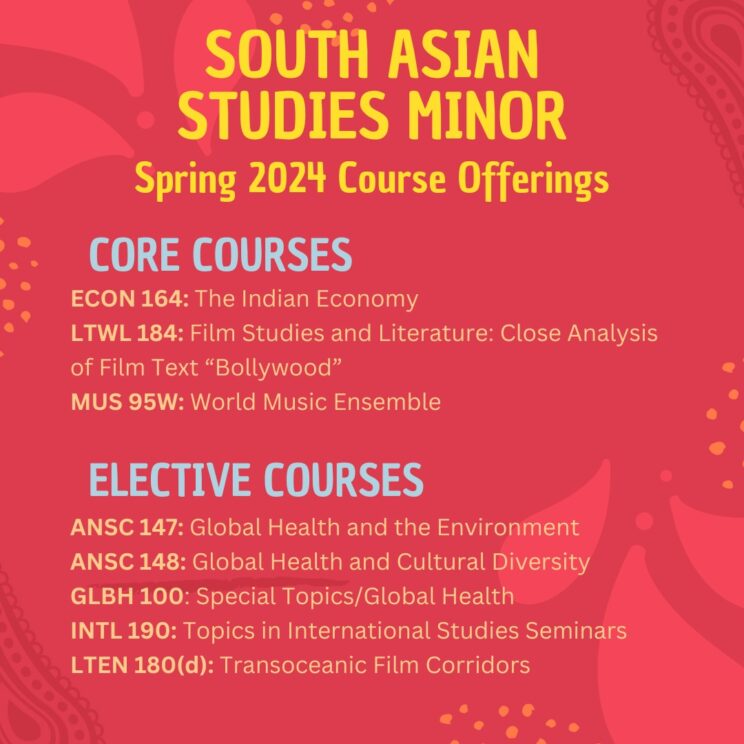For questions contact: Saiba Varma, Director South Asian Studies minor program at, s2varma@ucsd.edu, or check out the virtual advising center here!
A South Asian studies minor requires twenty-eight units, which should include three four-unit core courses (with 75–100% South Asia content) and four four-unit elective courses (with content of 25–50%). At least five of these courses must be upper-division. Only two upper-division courses (eight units) may overlap with courses taken for a major, and no more than two courses (eight units) may be taken with a pass/no pass grading option.
Check out the official minor page from ERC here! We publish a list of courses offered that count for our minor every quarter. For a list of courses, check out the website above – more are added regularly!
Courses for Spring ’24:
Here are some course flyers from past years!
- Winter 2020 Courses
Why should I do a South Asian Studies minor?
Statement from Akshata Silas, a 2020 UCSD Graduate of Cognitive Science w/ a specialization in Clinical Aspects, and South Asian Studies Minor.
As a junior in ERC who was jumping through hoops to balance GEs, pre-med requirements, and major classes, I would never have imagined myself doing a minor in the social sciences. But when a professor encouraged me to look into the newly inaugurated South Asia Studies minor, I realized that it could be a practical and transformative opportunity.
Logistically, most of the SAS courses I took overlapped neatly with foreign language, fine arts, and sociology GEs. The
wide range of classes offered for the minor allowed me to design a pathway specifically related to my interests , major, and career goals. Additionally, the minor introduced me to a supportive network of faculty and students, many of whom I’ve formed enduring friendships with through research and activism.
, major, and career goals. Additionally, the minor introduced me to a supportive network of faculty and students, many of whom I’ve formed enduring friendships with through research and activism.
The SAS minor gave me the chance to go out into the world and explore; my anthropology classes guided me through my first attempts at ethnographic research, and eventually helped me build my own independent research thesis. Other projects I worked on, such as drafting a policy proposal to the UN and documenting antifascist resistance efforts in South Asia, prepared me to become a catalyst for positive change. Perhaps most importantly, the courses I took for the SAS minor provided necessary historical and anthropological context for the real-world implications of what I learned in my STEM classes.
I would highly recommend this minor as a way to expand one’s understanding of new cultures, while simultaneously exploring their own current interests in a more global context











